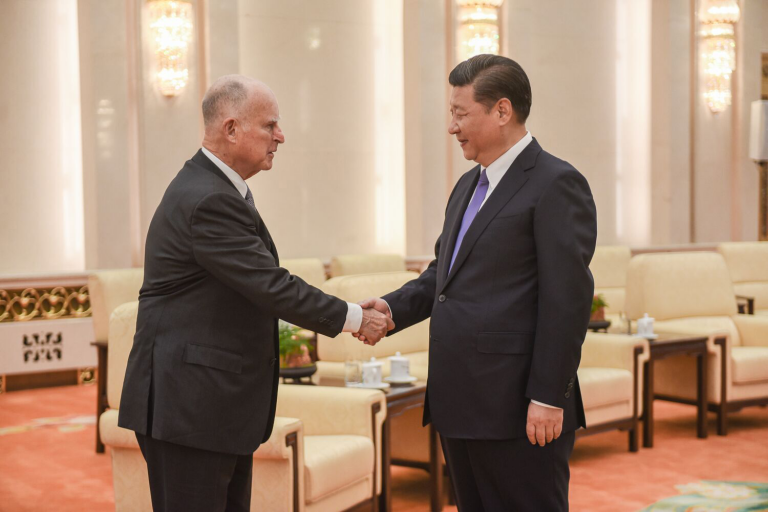 Via CA.gov 2017 archive
Via CA.gov 2017 archive
Subnational Diplomacy’s Role in U.S.- China Relations
The Biden Administration faces a precarious relationship with China and will need to balance strategic competition and collaboration while also confronting China on its poor human rights record and increasing global assertiveness. Secretary of State Antony Blinken highlighted the need to confront, compete, and cooperate with China as the biggest geopolitical challenge of the century. However, the challenge of finding an effective way forward is a seemingly impossible task, as underscored by the contentious first meeting between Biden administration officials and their Chinese counterparts.
Empowering and incorporating subnational diplomacy—diplomacy done between cities, states, and provinces—into America’s foreign policy strategy can offer the Biden administration a way forward in maintaining a relationship with China that uses the flexibility of cities and states to identify potential points of subnational collaboration, while engaging in strategic competition nationally.
China-U.S. Relations: A Balancing Act
As China’s regional and global power increases, maintaining a working, even if limited, relationship is vital to meeting U.S. national interests. China is the second largest economy in the world, expected to surpass the United States as early as 2028, and is the U.S.’s top trading partner. Preserving the economic relationship between the U.S. and China is critical to bringing foreign policy benefits to the American middle class—a strategy the Biden administration has prioritized. In addition, adequately addressing global issues such as climate change, global health security, and nonproliferation will require both bilateral and multilateral cooperation. Climate change is of particular concern given China is the largest energy consumer, largest producer and consumer of coal, and the largest emitter of carbon dioxide, making its clean energy transformation a vital component in addressing climate change and reducing global pollution.
Yet the Biden administration has made it clear that the U.S. must confront China’s growing global assertiveness and challenge of international norms. Points of contention range from coercive economic practices and intellectual property rights to wide-scale human rights abuses in Xinjiang, aggression in the South China Sea, and China’s recent crackdown on Hong Kong.
Subnational Diplomacy: A Way Forward
Subnational diplomacy can offer a way forward that allows American and Chinese cities to continue to collaborate on specific global issues, while national policy challenges China on human rights and its disruption of international norms. City diplomacy has already afforded cities increasingly global leadership roles on issues where national coordination has been insufficient. Cities’ flexibility often allows them to act where national governments are gridlocked, like the China-U.S. relationship. There is a limit to the collaboration these cities can achieve and facilitate, but with federal support and guidance, subnational diplomacy can work despite national tension to identify and tackle specific target areas of collaboration, like climate change and international health security.
The U.S. and China share 50 sister state-province partnerships and over 200 sister cities that have facilitated trade and investment into local communities, as well as cultural and educational exchanges. Previous subnational relationships between China and the U.S. demonstrate that local collaboration is possible even in the face of national tension. During the Trump administration’s trade war, three governors undertook trade missions to China to recruit foreign corporate investment. Despite tensions arising from the blame directed at China during early waves of the COVID-19 pandemic, economic and sister ties with China proved critical for U.S. cities to receive medical supply donations.
Chinese and American cities have also successfully collaborated on climate change before. Under President Obama, the U.S.- China Climate Change Working Group was established, which launched the U.S.- China Climate Smart Cities Initiative encouraging cities to continue to reduce emissions and advance climate action capacity-building. While this initiative ended under the Trump administration, subnational diplomacy efforts continued. California signed an agreement with China to work together to reduce emissions and expand trade of green technologies. Cities from both nations have continued to collaborate multilaterally through the C40 cities, a network committed to meeting the demands of the Paris Agreement.
In addition, federal support of subnational diplomacy can also allow for greater guidance and resources to monitor and safeguard against growing concerns of Chinese attempts to use subnational connections to exert undue influence on American politics.
As the Biden administration works to craft a strategy towards China that balances the intricacies of strategic competition, empowering subnational diplomacy through foreign policy initiatives can offer potential points of collaboration in U.S. – China relations and also bring the benefits of revitalized global engagement to average Americans.





